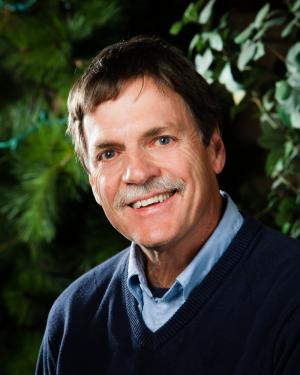"The Western Lonesome Society, where the old West Meets Magic Realism" Throwback Thursday Featuring Robert Garner McBrearty from issue 291.6
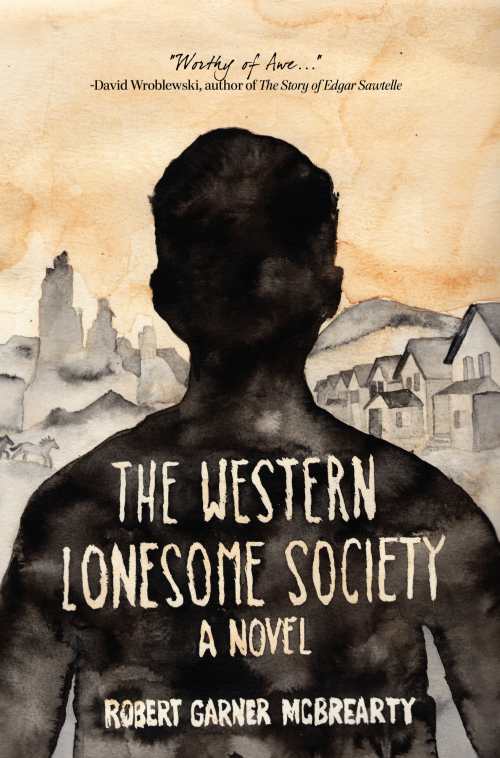
In this over-the-top literary Western, to honor his deceased mother's wishes, the protagonist Jim O'Brien writes the quixotic saga of his ancestors who grew up with a tribe of Comanches. Not quite in line with his mother's wishes, he weaves into the tale modern day stalkers, drug dealers, secret agents, strippers, a mad linguist, an imaginary therapist, the ghost of Ernest Hemingway, and an RV trip through the soul of the West. Having been displaced, the characters embark on the great American quest for a place to truly call home.
In "Episode", during Len's manic episode he's been staying up all night reading their deceased mother's take on the family's frontier days in Texas, and the impetus for the later novel is the mother's desire for her son to tell the family story. At the time I wrote "Episode" I was also in the earlier stages of writing the novel, and some of the material intertwined, but "Episode was influential in leading to the longer and fuller fictionalized treatment of the family's frontier days as depicted in The Western Lonesome Society. The main characters in "Episode" while not being replicas of the characters in The Western Lonesome Society bear a strong resemblance. The writing of those characters in the short story helped me a lot when I was writing the novel. The setting in "Episode", particularly the family house, also resembles some of the setting in The Western Lonesome Society. So I do see a strong linkage between "Episode" and The Western Lonesome Society. Without "Episode" I'm not sure if the novel would have come about, or at least not come about in the way it finally did.
"Episode" By Robery Garner McBrearty A Fictional piece featured in issue 291.6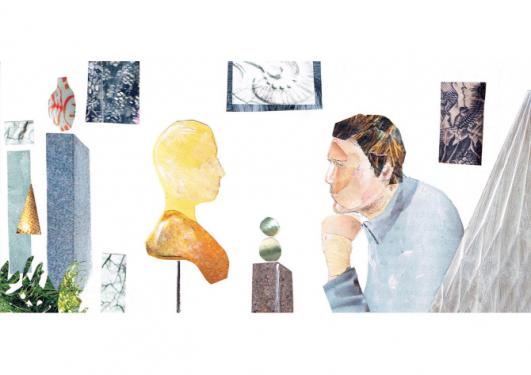
My older brother Len’s off his meds again. I’ve felt his breakdown coming the last couple of days, though my father hasn’t wanted to face up to it yet. This morning Len came into my bedroom and looked at one of my paintings on the wall, something I’d done in art school, an abstract southwestern landscape sort of thing, and not all that great. He stared at it, riveted, his eyes tearing up. “That’s the most beautiful painting I’ve ever seen,” he said. “That should be in the Dallas Museum of Art. That should be in the Louvre.” With his strong arms, he drew me to his chest. “I can feel that horse between my thighs. That’s me with the lance in my hands.” He moved closer to the painting, eyes round and shiny. “No, I’m both. I’m the Comanche and the one being chased. God, that’s brilliant! You’re a genius!” I stared at my painting, but hard as I tried I could not see a single Comanche. At least I had not consciously included an Indian in the painting. There was only the prairie rolling away to the distance, and some trees and boulders and lots of colorful swirls. He released me from his embrace, then gripped both my hands and held them in his calloused palms. “Don’t do manual labor with these,” he said. “Don’t be like me. I’ll send you money when you need it.”
He disappeared for the day, and now he’s surfaced late at night, and we sit at the kitchen table as he sips whiskey, a vain attempt to calm himself. Every few seconds, his hand opens and shuts like a man giving blood. Len’s thirty-two, I’m twenty-five, but since he started having his bipolar disorder a few years ago, I feel like the older brother. He moved back home with my father a few months ago, and I’m back home this summer after grad school, trying to get my bearings and move on.
He squints his eyes, cocks an ear, listening for something, listening maybe for the sounds of the horses’ hooves, the horses carrying the Comanches back through time into a moonlight raid on our house in the hilly suburbs north of Austin. Len had a thing about the Comanches, even when we were kids; in a kind of love and hate he’d talk in awe of them as the greatest horse warriors who ever lived. He’s been staying up all night this week, reading Larry McMurtry’s Lonesome Dove trilogy, James Michener’s Texas, and my mother’s roots material about our family’s frontier days, devouring thousands of pages of the novels and the family lore, apparently not the best reading material if you’re manic.
I take a breath, trying to steady my voice when I speak. “Listen, Len,” I say, “I talked to
Dr. Wilson.”
He lurches back as if stabbed, eyes widening at the mention of Dr. Wilson, the psychiatrist who he’s seen off and on for the last few years. “That old hack?” he says. “Doctor Electrode? You got anybody else on the list? I mean, Kenneth, really . . . ” He leans in close, breathing his whisky breath in my face, eyes turning squinty and wizened, like a con man working a deal. “Do we have any back up? Do we have a fucking plan here or not?”
“I should drive you down to the hospital, Len. You know, just get checked out.”
His voice edges into bitterness. “You mean checked in? Whose side are you on, Kenneth? Whose side?”
I feel my throat tightening. “I’m on your side, Len, you know that.”
He takes another swig at his whiskey glass. “Hey, I’m feeling good. I can handle this. This will all be gone in the morning. We’ll play golf. Do you want to play golf in the morning? Because I plan to play golf in the morning, and I’d like you to come.” He smiles widely. “It’ll be great, playing golf with you again.” He cackles with sudden laughter. “I’m not carrying your bag anymore! Remember the way you used to make me carry your bag when you got tired? You’re old enough to carry your own damn bag this time!”
I sit there, not answering, until he demands, “So do you want to play golf or not?”
I shrug my shoulders. “Sure, Len, whatever.”
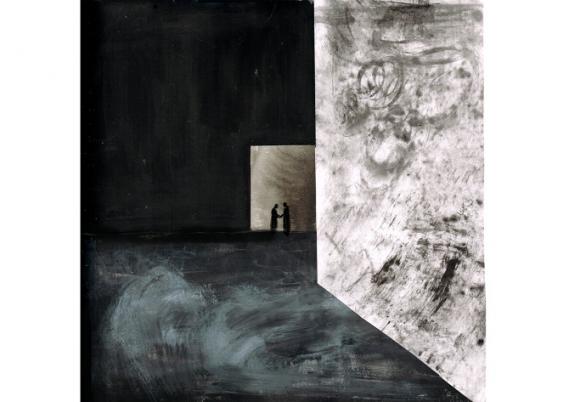 He lets out a long breath between tight lips, and leans in, eyes anxious. “Seriously, do I seem a little weird or something?”
He lets out a long breath between tight lips, and leans in, eyes anxious. “Seriously, do I seem a little weird or something?”
“Oh not, not at all. You don’t seem weird at all, Len.”
His shoulders shake with quiet laughter as he gets the sarcasm, knowing I think he’s being weird as hell, but the opening allows me to tell him the truth. “Len, I think you’re having an episode. We’ve got to get some help.”
He lowers his head, contemplates the suggestion for a moment, considers the weeks ahead in the hospital, the medications, and he sits back, squaring his shoulders as if to ward off something coming at him too fast and hard. “It happened here,” he says in a hushed voice. “Right here. Close your eyes. Listen.”
I stare at him, until he hisses, “Close your eyes.”
I close my eyes, and I hear a faint wind against the windows. I hear his breathing, a heavy agitated sound. I hear the tinkle of ice in his glass. “Do you hear it?” he asks.
I keep my eyes closed. “Hear what, Len? Hear what?”
“The screaming.”
I open my eyes. His lips tremble with excitement. “Do you get it now?” he asks. “It happened here, right here. Mother knew. She hinted at it. She was going to break it to me first. She knew I was the only one who could handle it.”
“What are you talking about?”
“Her roots stuff she was always looking into. Great-great Uncle Ira, the one who fought the Comanches?”
“I don’t remember anything about it.”
“God, how could I have missed it? Can’t you hear the screaming? People died here. That’s what she was trying to tell me. The house is full of spirits. It always has been.”
I shake my head. “I just hear the wind, Len. It’s just the wind.”
He smiles, nods his head with the pretend patience of one dealing with a slow-learning child. “Remember the arrowheads we found when we were kids?”
“Mom said those were from a peaceful tribe.”
“Of course she would tell you that. She tried to protect you.” He leans in close, eyes gouging into mine, his voice a rapid, hoarse whisper. “She knew. She referred to a ranch not far from here. A ranch where Uncle Ira lived with his wife and son. But it was here. Our house is built right over the bloody soil. This is where they fought and died.”
“In the kitchen?” I rock back in my chair, creating a little more space between us. “Holy shit, Len, you’re freaking the hell out of me.”
He stares at me, eyes glittering. “They 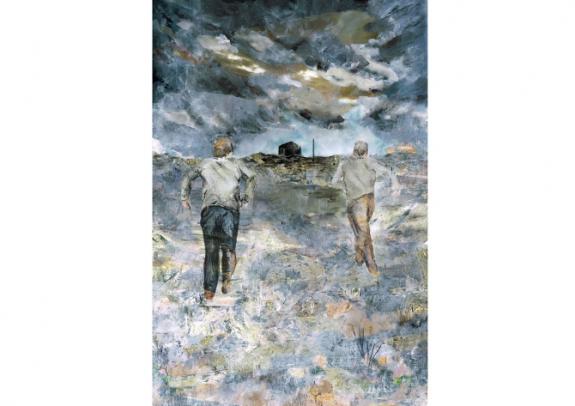 killed his wife and made off with the little boy. He grew up with the Comanches, but he
killed his wife and made off with the little boy. He grew up with the Comanches, but he
was ransomed back. Only he was never the same. He was wild. He could never adjust.” Len’s been hiding something in his lap and now he brings it up onto the table, a butcher knife from one of our kitchen drawers. “They were up in the hills watching. Then they rode in. It was pure adrenaline back then, Kenneth. Late at night, listening, wondering if this was the night they punched your ticket. It’s coming clear to me now. My God, it all makes sense now.”
He presses the point of the knife against the Formica table and spins it. He clasps it during its wobbly rotation. “I like knives,” he says. “Do you like knives?”
“They’re okay,” I say, hearing the quiver in my voice. “I kind of like butter knives. Do you want me to get you a butter knife?”
“I’ve always liked sharp knives,” he says. “The beauty, the power, the symmetry.” He tests the air with the blade. Short and thick-muscled, Len’s a pretty tough guy from his years of construction work and studying the martial arts. He’s let his hair get shaggy and his ragged beard has got some streaks of blood or ketchup in it. He stands and swoops around the kitchen, doing deep knee bends, coming up, sweeping the air with the knife. “Come at me,” he whispers to an imaginary enemy.
You can read more of Robert Garner McBrearty's piece, Episode on the JSTOR.
Artwork:
Grace Russell is a freelance Illustrator based in London. Her work combines disparate pieces of collage with paint and charcoal to create evocative imagery that is both playful and controlled; the careful interplay between the figurative and abstract give her illustrations a unique visual language that hints at underlying themes and provokes questions to be asked. Grace graduated with a First class BA (Hons) degree in Illustration from the University of Westminster, winning the Achievement Award in her first year. In 2014 she won the V&A Illustration Awards Student Category and was featured as one of Reyker’s emerging artists. She has worked with a range of clients including the V&A museum, Therapy Today, Voyeur (Virgin Australia/Pacific Magazines),Tablet Magazine, SOFFA, PRN Magazine, Sony and P&G.
Recommended
Nor’easter
Post-Op Appointment With My Father
Cedar Valley Youth Poet Laureate | Fall 2024 Workshop



